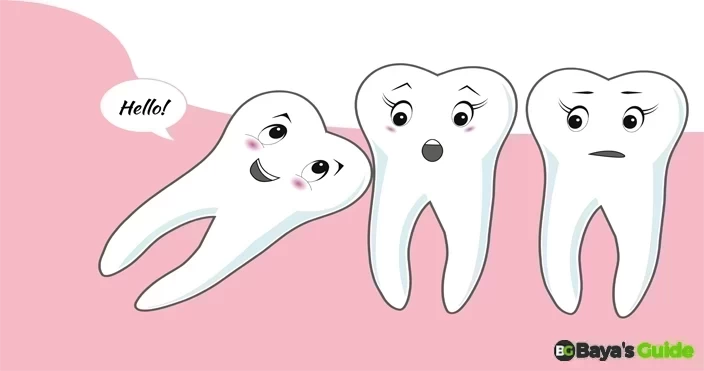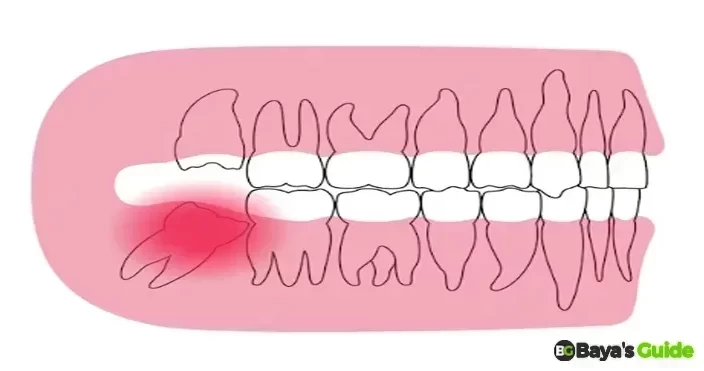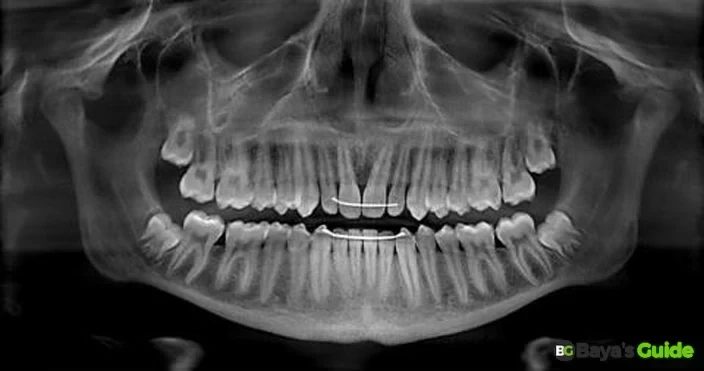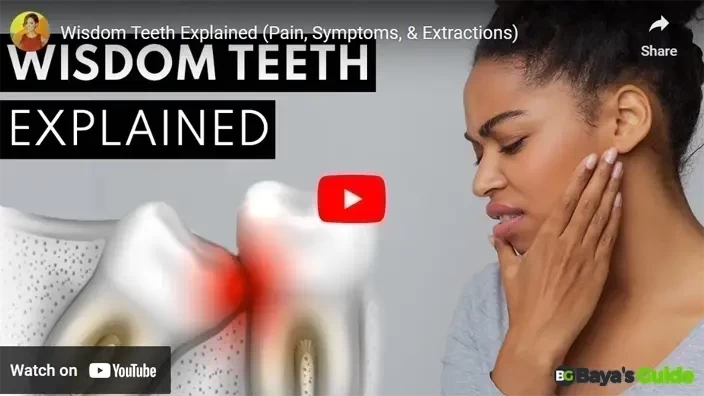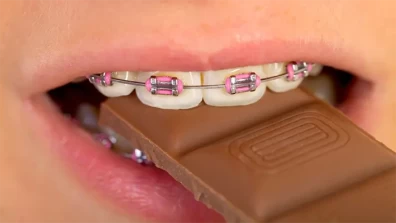Seeking dental health is a fundamental self-care element that dental practice expects in many people, and wisdom teeth eruption is a familiar fact in most people's lives. Did you know our ancient ancestors might have been more “evolutionarily” if they lacked wisdom teeth? As our brains grew bigger over time, our skulls got roomier, but our jaws shrunk, leaving less space for wisdom teeth. Not only that, but our cooking skills got an upgrade, reducing the need for extra teeth.
Typically, they appear between the ages of 17 and 25, but some even have wisdom teeth coming in at age 40. They are also called third molars and come in a set of four. You’ll find your wisdom teeth' location at the furthest rear of your mouth, directly behind your second molars. But what are the symptoms of wisdom teeth coming in, and what will happen if you don’t handle them properly? Let’s find out below!
Table of Contents
- Indications Of Emerging Wisdom Teeth - Causes, Symptoms, & Treatment
- Berten Dental Extracting Forceps FIG-79A for Lower Wisdom Tooth - 17 cm, Extraction Serrated Forceps, Heavy Duty Dental Forceps - Premium German Surgical Steel
- How To Handle Impacted Wisdom Teeth?
- Can Wisdom Teeth Cause Ear Pain?
- What To Do For Wisdom Tooth Pain Relief?
- 9 Ways To Get Relief From Wisdom Tooth Pain
- Does Everyone Have Wisdom Teeth?
- Frequently Asked Questions
- Conclusion
Indications Of Emerging Wisdom Teeth - Causes, Symptoms, & Treatment
You’ll know your teeth are emerging by having a dental X-ray. But you may also notice some wisdom teeth symptoms without an X-ray. The first signs of wisdom teeth coming in include white spots behind your second molars, swelling and redness of gums, and an aching jaw. Sometimes, you may have a fever, bad breath, or mild pain while opening the mouth, or your gums might cause molars jaw pain bleeding.
The wisdom teeth pain can range from mild to acute, depending on the type of food you often eat. You may feel a sharp pain in your second molars beside the wisdom teeth while chewing crunchy or chewy foods like nuts, seeds, fruits, or meat. However, the acute pain is often due to the impaction of wisdom teeth.
It happens when there isn’t enough room for wisdom teeth to grow properly. They get stuck, or they’re in a weird position. This can lead to painful infections, swelling, and even damage to nearby adult teeth and bones.
According to an American Academy of Oral and Maxillofacial Surgeons study, 9 out of 10 people have an impacted wisdom tooth. If you ponder over it, this is a high number.
Types of Impacted Wisdom Tooth
There are four types of impaction that people may go through in their lives:
Horizontal Impacted Wisdom Tooth
Horizontal impaction happens when your wisdom tooth is lying on its side, completely trapped beneath the gum. This can be extremely painful as it pushes against the neighboring teeth.
Vertical Impacted Wisdom Tooth
It occurs when your wisdom tooth is ready to appear but is still caught under your gum.
Mesial Impacted Wisdom Tooth
Mesial or angular impaction is the most common type due to your wisdom tooth pointing towards the front of your mouth, causing it not to grow properly.
Distal Impaction
It is a rare impaction that occurs when your wisdom tooth points toward the back of your mouth. Impacted wisdom teeth can also be sorted into two types: partial and complete. Partial impaction is when some part of the tooth has come out while the rest remains hidden under the gums. Complete impaction is when the whole tooth is stuck beneath the gum’s surface.
Then there’s another kind, buccal impaction, where you’ll feel your wisdom tooth cutting into your cheek. This occurs when the tooth lacks space to grow normally, so it pushes against the cheek. Wisdom teeth impaction can cause not only pain but also infection. The skin over the tooth flap can hurt and get all puffy, which is called pericoronitis. Having stuck wisdom teeth can cause gum disease, too.
You could even lose some bone and other teeth if it’s not fixed upright. As an impacted tooth is challenging to clean, it can result in the growth of bacteria. If the bacteria spread, you can get cavities or tooth decay in the back of the tooth next to it. Sometimes, a stuck tooth might even grow a lump or cyst, making things worse and maybe even causing you to lose the tooth or bone. So, the best course of action is to consult your dentist if your tooth is causing dental problems. Spotting and fixing the issue early on can help you avoid any significant problems.
Read More: How To Sleep With Frozen Shoulder
Berten Dental Extracting Forceps FIG-79A for Lower Wisdom Tooth - 17 cm, Extraction Serrated Forceps, Heavy Duty Dental Forceps - Premium German Surgical Steel
About This Item
- Non-reflective professional matting for reduced light reflections.
- Anatomically designed for ticks, ensuring precision.
- Working surface with transverse cuts for a stable tooth grip during extraction.
- Adapted to the maxillary arch and tooth structure.
- Crafted from heavy-duty premium German stainless steel for durability.
How To Handle Impacted Wisdom Teeth?
When it comes to handling impacted wisdom teeth, the usual move is to take them out surgically. However, oral surgery depends on how much your jawbone and nearby teeth are affected. When you head to the dentist, they’ll give you the once-over and snap some dental X-rays.
If surgery is recommended, your dentist or oral surgeon will cut into your gums and remove the tooth in chunks. You won’t feel any wisdom teeth removal pain as the procedure is done under anesthesia. Now, getting back on your feet after this surgery can take a few weeks. You might have to deal with some pain, swelling, and bleeding gums.
However, your dentist will give you pain relievers for any post-operative discomfort and a lowdown on how to take care of your mouth while it’s healing. Remember, following your dentist’s advice to the letter after surgery is key to steering clear of any complications like wisdom teeth infection after removal.
Can Wisdom Teeth Cause Ear Pain?
Yes, wisdom teeth can cause ear pain due to impaction. In some cases, impaction can result in a wisdom teeth headache, where the pain radiates around your jaw, face, and head. This happens because the nerves that go to your wisdom teeth also go to your ears and head. When the wisdom teeth get stuck or don’t fully erupt, they can put pressure on those nerves, causing ear and head pain.
What To Do For Wisdom Tooth Pain Relief?
You can use home remedies and take some preventative measures to help relieve your wisdom tooth pain, such as the following:
Use An Ice Pack
Grab an ice pack, wrap it in a towel, and lay it on your cheek around the wisdom tooth area for about 20 minutes. It will help with inflammation and pain.
Grab Some OTC Pain Helpers
Get your hands on pain relievers like ibuprofen or acetaminophen from the store. Read the label and use it as directed to dial down pain and swelling.
Rinse With Saltwater
Swish around some warm water (8 ounces) mixed with a teaspoon of salt to kill bacteria causing infection and calm down inflammation.
Use A Swab Dabbed With Clove Oil
Dab a bit of clove oil on a cotton ball and stick it near your wisdom tooth. Clove oil has natural anesthetic and antibacterial properties.
salt water
Tea Bag Trick
Steep a tea bag in hot water for a couple of minutes, let it cool slightly, and then plop it on your gum near the wisdom tooth for 15 minutes. It’s got tannic acid that can help soothe pain.
Gentle Gum Rubdown
Give your gums a little massage therapy by using your finger to rub them gently in circles around the wisdom tooth zone for a few minutes.
Watch Your Chewing
Keep away from chomping down on the side of your mouth where the wisdom tooth is causing the problem. Chewing there can just make things more painful and irritating.
9 Ways To Get Relief From Wisdom Tooth Pain
| Ways | Description |
| Saltwater Rinse | Gargle warm salt water to alleviate inflammation and promote healing around wisdom teeth. |
| Over-the-Counter Pain Relievers | Use non-prescription painkillers like ibuprofen or acetaminophen as directed for relief. |
| Cold Compress | Apply a cold compress for 15-20 minutes to reduce swelling and numb the pain. |
| Topical Anesthetics | Use over-the-counter oral gels or ointments with benzocaine to temporarily numb the painful area. |
| Clove Oil | Apply clove oil on a cotton ball for its natural anesthetic properties to treat wisdom tooth pain. |
| Avoid Certain Foods | Choose soft foods and avoid hard, crispy, or spicy products to prevent aggravation. |
| Proper Oral Hygiene | Gently brush and floss to maintain oral hygiene without causing additional discomfort. |
| Elevate Your Head | Sleep with a raised head to minimize blood flow to the affected area, relieving pain. |
| Tea Bags | Apply a cold, wet tea bag to the affected area; tannins may provide analgesic effects. |
Does Everyone Have Wisdom Teeth?
You may ask yourself, “Does everyone get wisdom teeth.” The answer is no. Not everyone has them, and not all four. Scientists have found that factors like family genes, evolution, and environment are important in how wisdom teeth grow. A study states that around the world, about 22.63% of people have missing wisdom teeth. Additionally, women are more likely than men to miss at least one tooth.
Frequently Asked Questions
What Does Wisdom Teeth Coming In Feel Like?
Common symptoms of incoming wisdom teeth include gum pain and swelling, jaw discomfort, earache, and difficulty chewing. Trapped debris in the molars can cause bad breath, while the teeth may also pressure the sinuses, leading to infections with symptoms like runny nose and facial pain.
How Do I Know If My Wisdom Teeth Are Coming Through?
Signs of emerging wisdom teeth include gum pain and swelling, jaw and ear discomfort due to pressure, chewing problems, and bad breath from trapped debris. Potential sinus infections and white specks on the gum line behind the second molars also indicate the incoming wisdom teeth.
How Long Does It Take For A Wisdom Tooth To Come In?
Wisdom teeth emergence time varies individually. But typically, they emerge between 17 and 25, sometimes later or not at all. Their emergence time depends on tooth position. Proper alignment takes weeks/months, while impacted teeth may take longer. Factors such as genetics, jaw size, tooth position, and health conditions like diabetes also influence their emergence time.
What Are The Benefits Of Keeping Your Wisdom Teeth?
Deciding on keeping wisdom teeth varies per individual. Although they have no benefits, retaining them might have some advantages. These include more chewing areas for efficient food breakdown and aiding the stability of adjacent teeth. They are also valuable for those chewing hard foods or with missing teeth.
Do All Wisdom Teeth Need To Be Removed?
No, not all wisdom teeth require extraction. You can remove wisdom teeth if you wish. It depends on tooth position, jaw size, and oral health. Healthy, well-spaced wisdom teeth may not need removal. But impacted teeth or potential complications might lead to dentist-recommended extraction.
Conclusion
Hopefully, we were able to answer your query regarding “How to know if your wisdom teeth are coming In?” Being aware of the symptoms, such as gum pain, swelling, jaw pain, and impaction, can help you determine if your wisdom teeth are emerging.
Remember, if you experience any of these symptoms, you must consult a dentist for a proper evaluation and guidance on the best steps to take. Monitoring your oral health and seeking professional advice will ensure you manage the arrival of your wisdom teeth with care.

